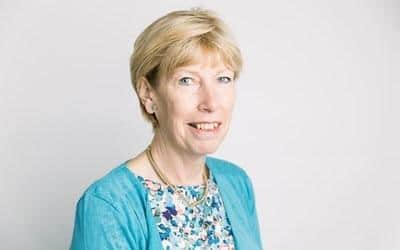FASD Scotland: 'I felt like the worst parent in the world' - 'hidden' condition is more common than autism and ADHD
But a couple of years later this changed. She stopped sleeping, became violent, and was unusually upset by transitions, like leaving the house or beginning a new activity.
At first Gemma Manning, 40, thought her daughter was just going through the “terrible twos”. But the problems continued, and she soon realised it wasn’t normal.
Advertisement
Hide AdAdvertisement
Hide Ad“She would just go from zero to 100 in a heartbeat,” said Ms Manning.
“From a very early age she started going to the knife drawer. She started saying things like ‘I want to cut you, I want to make you bleed’.”
But Isabelle only behaved like this at home, and at school and in public she was “very good at putting on a mask”.
“I felt that I was the worst parent in the world, and I was obviously doing something wrong,” said Ms Manning.
When she explained the problems, healthcare professionals suggested “in a nice way” that Ms Manning and her husband were to blame, and offered to put her on a parenting course.


In a bid to combat the violence and teach Isabelle some empathy, her parents got her a dog when she was four years old.
But they soon noticed the dog appeared scared, and realised Isabelle was harming it out of sight.
It was this detail which eventually broke through to the professionals who had so far been unable to help. Isabelle was referred to a paediatrician she hadn’t seen before, who diagnosed foetal alcohol spectrum disorder (FASD) “within 20 minutes”.


A “hidden” condition
Advertisement
Hide AdAdvertisement
Hide AdFASD is a neurodevelopmental condition which occurs in some people if their birth mother drank alcohol during pregnancy.
It can serious and life-changing symptoms, and is estimated to affect around 172,000 people in Scotland.
But experts believe only around one per cent of those have been diagnosed, and this “hidden” condition is flying “under the radar” in Scotland, with unborn babies more at risk due to a lack of proactive public health campaigns.


With a prevalence of between three and five per cent, FASD is three or four times more common than autism, and four times more common than cerebral palsy.
It can affect behaviour, including hyperactivity and impulse control, concentration and thinking, as well as some physical symptoms.
Dr Patricia Jackson, president of the Scottish Paediatric Society and chair of the group which developed the UK’s first guidelines on FASD diagnosis, SIGN 156, finds the lack of awareness of FASD “really surprising”.
“I don't think you'd meet anybody out there in the general population who didn't know about autism, and probably have some depth of knowledge about it, but there aren't too many people that you'll talk to who know about FASD,” she said.
Some people with FASD have specific facial features, leading to simpler diagnosis. But not enough people realise this is only true of around ten per cent of cases, said Dr Jackson.
Advertisement
Hide AdAdvertisement
Hide AdDr Jonathan Sher, senior fellow at the Queen’s Nursing Institute Scotland, is one of the co-authors of an FASD learning resource published by NHS Education for Scotland.


When he first moved to Scotland from the US 16 years ago he was “startled” at the lack of awareness of FASD. It is much more widely known in other countries including the US, Canada and Australia.
The topic is less of a “blind spot” now, but he still believes it is too little-known.
“There's just no other condition that I know of that is this serious and this prevalent for which there is not a much more robust response,” he said.
Many of the professionals Ms Manning spoke to had never heard of FASD, and some suggested other conditions instead.
Having worked in special needs schools, she could see that some of Isabelle’s traits were like autism, but that it didn’t completely “fit”.
According to Dr Sher this is very common, as FASD often occurs alongside other conditions, such as autism or ADHD, and clinicians will too often stop looking once they have made one diagnosis.
No alcohol, no risk
Experts and campaigners want this to change, and for women to be made more aware of the risks of alcohol in pregnancy.
Advertisement
Hide AdAdvertisement
Hide AdThey want to target women who know they are pregnant but believe some alcohol will do their baby no harm, and those who do not yet know they are pregnant and continue to drink for the first few months.
Just under half of pregnancies in Scotland are estimated to be unplanned.
Dr Sher points to several “misconceptions” about alcohol and pregnancy. On one hand the idea that one drink will doom your baby is nonsense, he said, but on the other, so is anecdotal evidence that someone you know drank throughout their pregnancy and their children were fine.
“There are people who drink and their children are just fine,” he said.
“And there are other people who drink very moderately and their children are not fine. It's best understood as a significant risk factor, not as a sure thing in either direction.”
Several factors affect whether or not a baby will be born with FASD, and experts are not yet certain what these are, or how much alcohol could be considered safe.
Until research progresses further, the message is “no alcohol, no risk”, meaning the only way to rule out FASD is by not drinking at all.
“The bottom line is really simple,” said Dr Sher.
“There are two ways to guarantee no FASD. One is no alcohol during pregnancy, and the other is no pregnancy while consuming alcohol. It’s surprising to me that the same kind of successful campaign around drink-driving hasn't translated into FASD prevention.”
Advertisement
Hide AdAdvertisement
Hide AdDr Jackson added: “We know that people who drink a great deal are more likely to have a child affected. But it’s not specific. We just aren't diagnosing enough people to be able to have that research information. So the only thing we can say is ‘no alcohol, no risk’.”
Ms Manning finds it “mind-boggling” that there is not more public information available about FASD in Scotland and the risks of drinking during pregnancy.
“It’s amazing to me that there’s not even a government leaflet for pregnant women about FASD,” she said.
“It’s heartbreaking to think how we’re going to change this. How are we going to get the message out there?”
While there is no leaflet, information about FASD is included on the “Ready, Steady, Baby!” information website funded by the Scottish Government, and a spokesperson said the government is committed to “raising awareness of the potential dangers of consuming alcohol at all stages of pregnancy”.
The spokesperson added: “All pregnant women in Scotland are asked about their drinking habits as part of their midwifery booking appointment and offered support if required.
“We will continue to work with health professionals to support pregnant women, and women planning to become pregnant, to make them aware of the harmful effect that drinking can have on their baby.”
Ms Manning believes increased awareness would make diagnosis easier. While some parents may not wish for a “label” for their child, it can help to understand how best to support them.
Advertisement
Hide AdAdvertisement
Hide AdIn Isabelle’s case diagnosis was a turning point for her and her family.
“She has a brain injury. She's literally neurodivergent, and everything that she's doing is a symptom of a disability,” said Ms Manning.
“There are reasons behind what she's doing, even though it looks like bad behaviour, or scary behaviour sometimes.”
Following her diagnosis, Ms Manning and her husband parent Isabelle, now eight, in a completely different way.
She has a strong structure to each day, and repetitive routine. Her parents support her through transitions, such as changing activity, by giving her advance warning and treats after the move.
“Because all of these supports have been put in place for her, her anxiety has gone down,” said Ms Manning.
“We know now that when she was younger all those behaviours were just a sign she wasn't coping, she didn’t understand what was going on and she was overloaded.
“Now she’s so much more relaxed.”
The most violent behaviours have stopped, and while Isabelle still has challenges, she is more relaxed and able to cope much better.
Advertisement
Hide AdAdvertisement
Hide AdMs Manning finally found support from the FASD hub run in Scotland by Adoption UK and supported by the Scottish Government, which offers advice and community people affected by the condition.
Her story is not uncommon, said Aliy Brown, the hub’s FASD services manager.
“There’s still a huge need and a lot of misunderstanding around FASD,” she said.
“A lot of families can feel isolated and misunderstood. And because there isn’t a diagnosis in place a lot of children within school unfortunately are seen as behaving badly, and misunderstood.”
The FASD hub helps parents to understand their children, she said, and change their parenting techniques.
“This is a brain-based condition, it’s neurodevelopmental difference,” she said.
“By accommodating the child, changing the environment, changing the way we think as adults, we can support our children or young people.”
Ms Brown would like to see a more holistic approach to diagnosis, with clinicians looking at a child’s difficulties and considering what conditions they might point to, rather than undertaking specific assessments for things like autism or ADHD.
Advertisement
Hide AdAdvertisement
Hide AdIt can be very difficult for adopted children to get a diagnosis, as there is not always evidence that the birth mother drank alcohol during pregnancy.
According to Dr Jackson there are three categories a child with symptoms might fall into.
If they have the facial features associated with the condition, or a documented history of their birth mother having drunk alcohol in pregnancy, then they can be diagnosed.
But if they have symptoms of FASD but no facial features, and there is no record of alcohol consumption during pregnancy, then they cannot be given a diagnosis.
Instead their condition can be categorised as “not known”, and considered at risk of FASD.
Ideally this should give them access to the same kind of support as those with a diagnosis, but Dr Jackson recognises that this is currently not always the case in Scotland.
Instead, without facial features or an obvious history of alcohol in pregnancy, many clinicians do not even consider FASD, and children remain misunderstood and unsupported.
In future it may be possible for people to be diagnosed based on symptoms alone, but as yet there is not enough known about the condition, even in countries like Canada which are about a decade more advanced in their knowledge of the condition.
Advertisement
Hide AdAdvertisement
Hide AdDr Jackson wants to see much better alcohol histories taken from patients in Scotland. Care professionals asking about drinking habits should become routine, she said, and as such a high proportion of pregnancies are unplanned this should be done even when the patient is not pregnant.
This information could then be used to inform later considerations of a child’s symptoms.
Ms Brown has three children who she believes were exposed to alcohol in the womb, but only one of them has an FASD diagnosis.
Her children struggle with sleep and impulse control.
“Our kids are genuinely really lovely people,” she said,
"They are pro, pro, pro-social. They want relationships with people, they want to interact with you.
“They are in your face, excited about the world, excited about stuff around them, and just loving life.
“But sometimes that is at high speed, and not necessarily thinking about the next thing that’s going to happen after they’ve done this really good idea in their head.
“That can come with some consequences.”
A small study in Peterborough in 2015 found that 75 per cent of children put forward for adoption had been exposed to alcohol in the womb, and a 2020 report from Adoption UK said the condition may be more likely in this group as maternal alcohol misuse is a common factor in children being taken into care.
But Ms Brown stressed FASD is not a condition which only affects those who are adopted.
“This is a whole-population problem,” she said.
“I can’t really stress how massive this is.”
Advertisement
Hide AdAdvertisement
Hide AdDr Sher and Dr Jackson both pointed to the babies of wealthy young professional women as also being at risk. Relatively this is a smaller risk group, but it is not uncommon for these women to drink regularly, and to continue doing so while not realising they are pregnant.
Dr Sher added some women in this group do not consider themselves at risk, as they are drinking moderately and may subscribe to the belief that alcohol-related issues in pregnancy only affect “alcoholics”.
Ms Brown believes part of the reason for higher rates of FASD diagnosis in those who are care experienced is the stigma around drinking while pregnant, which affects birth mothers more than adoptive parents.
“People think an FASD diagnosis means the person who consumed alcohol must have been an alcoholic, and that’s just not true,” she sad.
“The messaging is no alcohol, no risk. This isn’t about care experienced children being more at risk. This is everybody’s business, everybody needs to know about it.”
Ms Manning agrees she may be more willing to speak about FASD because she is not Isabelle’s birth mother, and so cannot feel “blamed” for her condition.
The stigma around women drinking alcohol in pregnancy needs to change, she said, moving to information and support rather than blame.
Dr Sher said it is “cruel and ineffective” to blame women for drinking in pregnancy.
Advertisement
Hide AdAdvertisement
Hide Ad“I think that one of the continuing problems is the extent to which as societies we name, shame and blame women for for drinking when that's only part of a much bigger story of why women drink, what we know about contraception and what we do,” he said.
“The one thing that is certain almost all the time is that no women are drinking in order to harm their babies. So, blaming him for something that happened that was never their intention doesn't make a lot of sense.”
He added: “In Scotland as in the UK, as in many other OECD nations, we pretend that there are two realities. One is that women are avoiding pregnancy, and the other is that they are pregnant.
"There's room in between those two, which is about actually preparing for pregnancy in ways that will lead to what everybody wants: a safe pregnancy, a healthy baby and a thriving family. And FASD is one of the things that keeps that good result that everybody desires from actually happening.”
Comments
Want to join the conversation? Please or to comment on this article.
